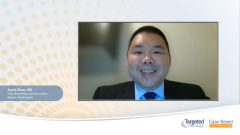
The Role of Immunotherapies in Upper GI Cancers
Expert perspectives on the role of immunotherapies in upper gastrointestinal cancers, highlighting the CheckMate 649 study investigating frontline nivolumab plus chemotherapy.
Episodes in this series

Case: A 60-Year-Old Man with Stage IV Gastric Adenocarcinoma
Clinical Presentation:
- A 60-year-old man with abrupt 10-pound weight loss, dyspepsia, bloating after meals, and loss of appetite, and all symptoms worsening over the past three months.
- PMH and FHx: Overweight and HTN. Patients father deceased at age 50 due to gastric cancer.
Initial Clinical Workup and Diagnosis:
- EGD showed 2 cm protruding mass in the body of the stomach
- No Ulcerations
- Biopsy showed poorly differentiated adenocarcinoma
- Stage IV adenocarcinoma
- Molecular Testing: HER2/neu –; MMRp/MSS, PD-L1 CPS 5%
- CT of abdomen and chest reveal a gastric polypoid mass and thickening; No ascites; 2 lesions in the left lower lobe.
- Lung Biopsy: metastatic adenocarcinoma consistent with gastric primary
- PET/CT confirmed metastatic disease
Current Treatments:
- Patient was initiated on FOLFOX +nivolumab
This is a video synopsis/summary of a Case-Based Peer Perspectives series featuring David Zhen, MD.
CheckMate649 led to the approval of nivolumab in combination with FOLFOX (leucovorin, fluorouracil [5-FU], and oxaliplatin) or CAPOX (capecitabine and oxaliplatin) for metastatic gastric cancer. The trial's primary end point focused on patients with a PD-L1 combined positive score (CPS) 5% of greater. Three-year follow-up data presented at the American Society of Clinical Oncology Annual Meeting demonstrated an overall survival benefit with a median of 14.4 months in the chemo-immunotherapy arm vs 11.1 months with chemotherapy alone (HR, 0.7). Progression-free survival and objective response rates also improved with the addition of immunotherapy.
KEYNOTE-859 led to the approval of pembrolizumab in this setting, despite the earlier negative KEYNOTE-062 study, which was underpowered. While the benefit of immunotherapy is clear for patients with PD-L1 CPS of 5% or above, the role of PD-L1 expression in guiding treatment decisions remains challenging. Some benefit may exist for patients with CPS of 1% or above, but the benefit is lacking for those with a CPS of 1% or below. Zhen continues to administer immunotherapy in his practice, given the overall patient population survival benefit, but he acknowledges the need to identify patients who are more likely to benefit while considering potential immune-related toxicities.
In practice, after 4 to 6 months of first-line chemo-immunotherapy without progression, Zhen often transitions to a maintenance regimen of 5-FU and nivolumab until disease progression, which has resulted in prolonged disease control for some patients.
Video synopsis is AI-generated and reviewed by Targeted Oncology™ editorial staff.










































